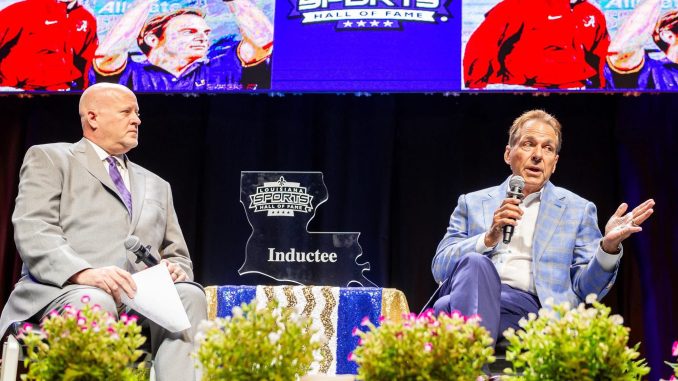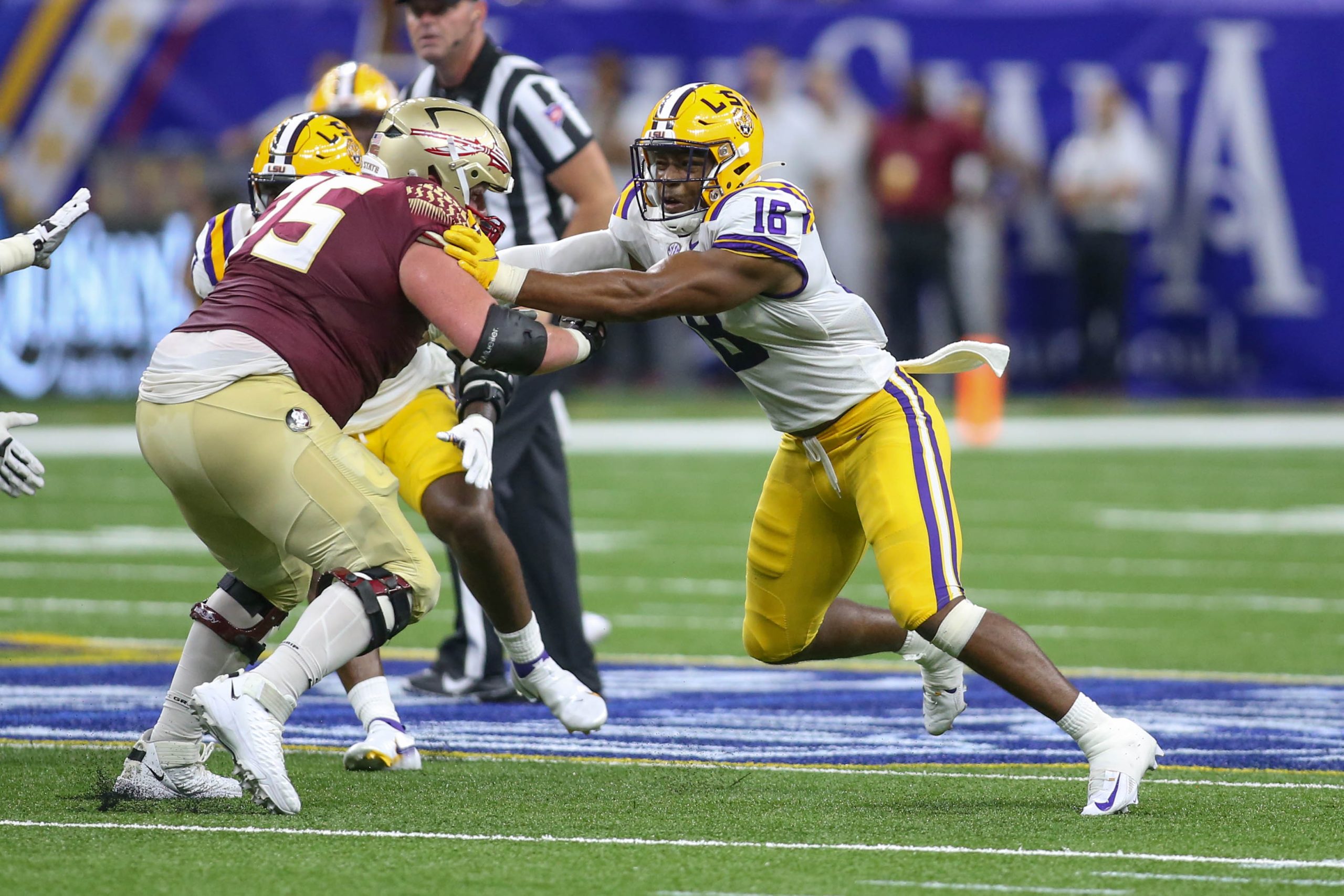
GLENN GUILBEAU, Tiger Rag Editor
NATCHITOCHES – As throngs of LSU fans and Louisiana people cheered Nick Saban amid a record crowd of nearly 1,000 at the Louisiana Sports Hall of Fame induction ceremony Saturday night, it was hard to imagine that this same man was hung in effigy in Baton Rouge not long ago.
He was the scourge of the LSU Nation the world over. He was Nick Satan as Alabama’s football coach from 2007-2023 after leaving LSU’s coaching job for the Miami Dolphins after the 2004 season, then resurfacing at the Tigers’ most hated rival – mainly because of a history of losing to the Red Elephants.
Coach Nick Saban was formally inducted into the @LaSportsHall it was wonderful to see. He’s said on many occasions, “I should have never left LSU.” Yeah he eventually became the 🐐 @AlabamaFTBL but @LSUfootball’s Golden era began with his 2003 Title.👏 pic.twitter.com/ng4eepo8Pr
— Tim Brando (@TimBrando) June 29, 2025
And Saban was the Elephant in the Room on this night, but the one-time LSU national champion coach and six-time national champion Crimson Tide coach stormed and stampeded the Natchitoches Event Center with niceties and love as if he was Cajun born.
“I appreciate being recognized here,” Saban, the 73-year-old Fairmont, West Virginia, native, said at the podium. “I’m really, really proud. Every time I’d see LSU all the time I coached at Alabama, and I know it was a great rivalry, I was always proud because I felt like we did something to raise the bar here. And the program has been outstanding ever since.”
Saban won LSU’s first national championship in football since 1958 in his fourth year with the Tigers in the 2003 season with a 21-14 win over Oklahoma on Jan. 4, 2004, at the Superdome in New Orleans. He left a year later after the 2004 season to coach Miami, but not after leaving the No. 1 recruiting class in the nation in 2003 and No. 2 in 2004.
When his replacement, Les Miles, won the 2007 national title, he did it with more than 30 players signed and recruited by Saban and most of those coached by him. Never has a coach left a program with more talent, as most coaches who leave for other jobs tend to do it after their glut of talent has left. Saban, instead, found himself coaching against those same LSU elite players he recruited while in his first season at Alabama in a 41-34 loss to LSU in Tuscaloosa in ’07.
“It actually sort of set new horizons at LSU,” Saban said. “After winning a championship here, it seemed like, ‘OK, that’s the standard from now on.’ Prior to that time, they never really thought about winning the national championship. A lot of great players, a lot of great people, a lot of great friends still. We appreciate it.”
A player or two actually still remained for the 2008 season as well when Saban was in his second season at Alabama. He returned to LSU that year to coach against Miles and the defending national champions at Tiger Stadium. Fans hung him in effigy around town before the game as he was persona non grata with a capital N.
And just two years before as Miami’s coach, he was cheered like an old friend by LSU and Saints fans alike in Tiger Stadium in the Dolphins’ win over the Saints, who had to move home games to Baton Rouge in 2005 because Hurricane Katrina tore the roof off the Superdome.
Nick Saban on his stint at LSU during his induction into the Louisiana Sports Hall of Fame:
— On3 (@On3sports) June 29, 2025
"I felt like we did something to raise the bar here. And the program has been outstanding ever since."
(via @JacquesDoucet)https://t.co/3vRBQdvndw pic.twitter.com/66EXW5F3sJ
“I’d get booed quite a bit in the stadium,” he said of his Alabama years. “But we always had a boatload of people come visit us at the hotel. They were truly friends. You know, you got two kinds of friends when you’re in this business. Some are contingent on you being the coach, and some are just good friends.”
One LSU friend who often stayed at the Saban’s home in Tuscaloosa when the Tigers played there was Baton Rouge-based construction magnet Lenny Lemoine, who was in Natchitoches Saturday. The Lemoines and the Sabans vacationed in Europe together in the summer of 2023, and Lemoine correctly predicted that ’23 season would be his last.
“He’s really enjoying this,” Lemoine said. “It’s no secret that his time at LSU meant a lot to him.”
Saban and the No. 1 Tide won that game in 2008, 27-21, in overtime and would go on to beat LSU in 13 of the next 17 meetings, including in the national championship at the dome in the 2011 season, before Saban retired after the 2023 season and became one of ESPN’s top college football analysts and an Emmy winner on GameDay.
Meanwhile, LSU won another national championship under coach Ed Orgeron in the 2019 season after the No. 1 Tigers beat the No. 2 Tide and Saban, 46-41, in a Game of the Century at Alabama that season.
“If you’ve loved LSU Football this century, he’s the first person to thank,” Louisiana Sports Hall of Fame announcer Lyn Rollins said over the loudspeaker as Saban took the stage Saturday night.
“Breathing life into a struggling program all the way to two SEC titles and the 2003 national championship and laying the foundation for all of the success since,” Rollins said. “College football’s greatest coach – from LSU, Nick … SABAN.”
LSU had losing seasons in eight of its 11 previous seasons when Saban left Michigan State for LSU after the 1999 season. Coach Gerry DiNardo did have three winning seasons with bowls from 1995-97 with a 45-26 win over Saban and Michigan State in the 1995 Independence Bowl. But there were 10 straight SEC losses from the end of a 4-7 season in 1998 with three and then seven more in a 3-8 season in 1999 before Saban arrived. There were also six straight losing seasons from 1989-94.
Legendary coach Nick Saban talks about raising the bar and the LSU football program during the Louisiana Sports Hall of Fame Induction Ceremony, June 28, 2025 in Natchitoches, LA.
— Louisiana Sports HOF (@LaSportsHall) June 30, 2025
Watch the full ceremony at https://t.co/OqbyNLoMzT#lshof #natchitoches #lsufootball pic.twitter.com/pw4OULDaau
And Saban almost didn’t take the job, which would be one of the most high paying in college football at the time at $1.2 million a year.
“But I said I can’t take the job because I’ve never been to LSU before,” he said. “I don’t know what it’s like. And I can’t go for an interview because if they find out publicly at Michigan State that I’m thinking of going someplace else, they’ll absolutely crucify me. So, I sent Miss Terry to interview.”
Laughter roared through the crowd, including from Saban’s wife Terry at his table.
“This is the God truth,” Saban said.
LSU chancellor Mark Emmert, who solely hired Saban and quickly agreed to the $1.2 million salary, had his wife DeLaine show Mrs. Saban around LSU and Baton Rouge for two days in December of 1999 before the news broke.
“They saw billboards of everybody LSU wanted to hire. My name wasn’t on there,” Saban said. “So I called and I said, ‘Well, what’d you think?’ And she said, ‘Man, this place needs a lot of work.’ She said the stadium’s in bad shape. They have no academic facilities. They have no academic support center. The players are not doing well academically. She said you have to get in the bus and ride to practice every day from the campus because the facilities are separated.”
The coaches’ offices were across Nicholson Drive from the practice field as was the weight room.
“But she went into the weight room and said, ‘They got some damn good looking players,'” Mrs. Saban told her husband.
“So, that’s how I took the job,” he said. “But then when I got there, and I saw what she saw without seeing any players, I went in the corner and talked to her on the phone and said, ‘Terry, this is not really what I thought it might be after our interview.’”
And Mrs. Saban provided the coaching moment that changed the course of LSU Football.
NICK SABAN TOOK COACHING FROM HIS WIFE
“She said, ‘Put your big boy pants on, and get your ass in the press conference and go to work,’” Saban said. “So, that’s what we did.”
And more applause broke out.
“It’s really the first job that I ever had where everybody was all in on what we had to do to be successful – the administration, the Tiger Athletic Foundation, the fans,” Saban said.
He soon got an academic center for athletes built. LSU also constructed a new football-only facility next to the practice field for players and coaches with a new weight room. Saban was coaching Miami when it opened, though, in 2005. Miles instead moved in and showed Saban the place when he was in town for that Dolphins-Saints game that season.
“You can’t get recognized into a Hall of Fame without thanking all the people who contributed to the success that you had. And we had a tremendous amount of support at LSU,” Saban said. “And there probably was never a place where I was given an opportunity to be trusted by people who helped set the table, so that we could do it.”
It was at LSU that Saban won his first championship as a coach – the 2001 Southeastern Conference crown with a 31-20 upset by the No. 21 Tigers of No. 2 Tennessee in the SEC Championship Game in Atlanta. That was LSU’s first SEC title since 1988. Then when LSU beat Illinois, 47-34, in the Sugar Bowl on Jan. 1, the Tigers broke an 0-for-5 skid in New Year’s Day bowls by winning their first since a 20-13 win over Wyoming on Jan. 1, 1968, in the Sugar Bowl.
“That was the first championship I ever won,” Saban said. “And I think we can apply this to our life. Once you accomplish something, it sets a new horizon. It sets a new standard. And then in 2003 when we won the national championship, that set a new horizon and a new standard. And I’m very proud of the fact that that contributed to the iconic brand that LSU has and the state of Louisiana has. Because a lot of people in this country look at this state through the athletic programs at LSU.”
Saban thanked his athletic director at LSU from 2001 through 2004 – Skip Bertman, a five-time national champion baseball coach at LSU and member of the Louisiana Sports Hall of Fame.
“He had a lot to do with this. He and I went and raised $15 million in three months to build an academic center so our players could graduate,” Saban said as more applause broke. “That was part of the commitment to success. I think that all of us, when we get rid of some of the self-imposed limitations that we have, and we accomplish something of significance – even small significance – it’s a new horizon. And you do it the next time, and it’s another new horizon. And then all of a sudden, it becomes the standard and an example for a lot of other people.”
Saban’s last horizon at LSU set the sun for many more at Alabama.
“There was no greater feeling in my life professionally to that point when we won the national championship in the Sugar Bowl in New Orleans, and saw LSU in that city,” Saban said. “And it made everybody in this state proud. And that was my best professional moment to that point in my career.”
He was on his way.
And it happened in Louisiana and at LSU first.




Be the first to comment